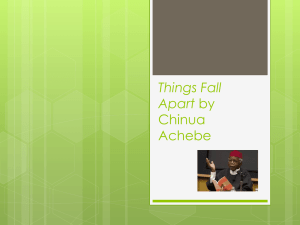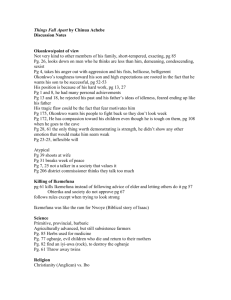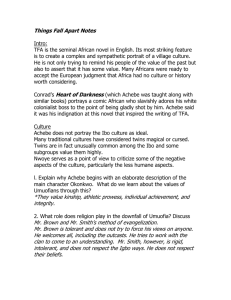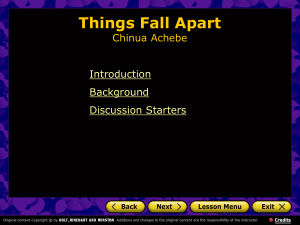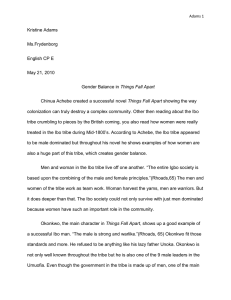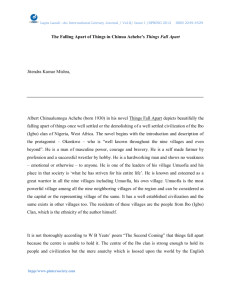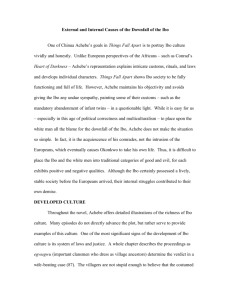Chapter 3
advertisement
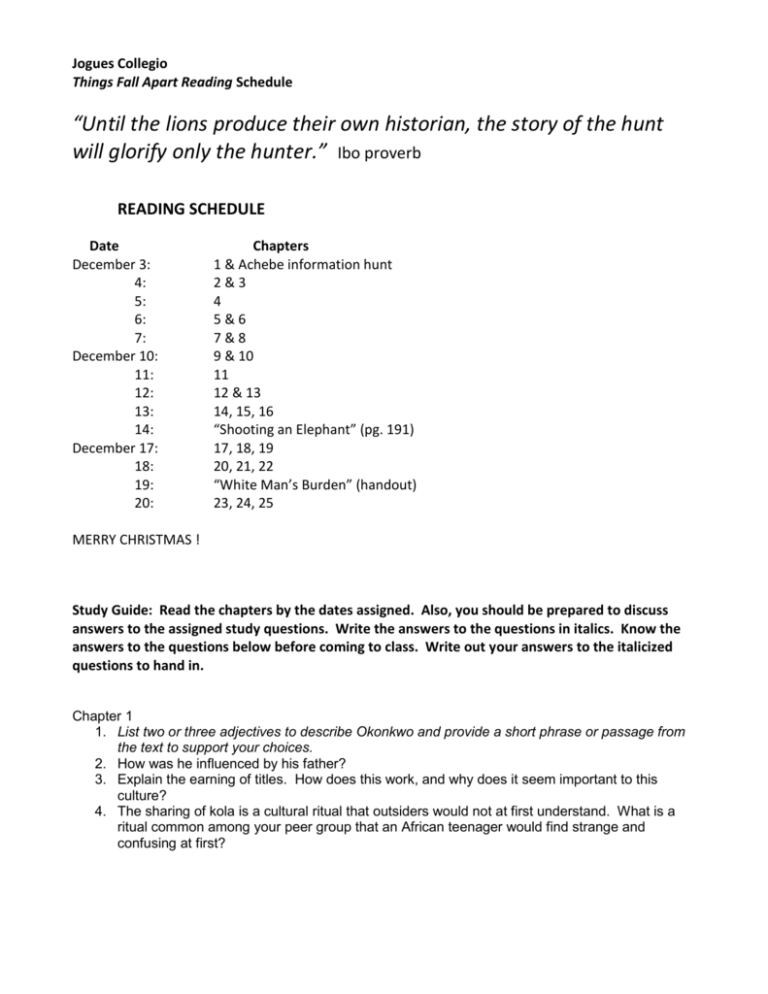
Jogues Collegio Things Fall Apart Reading Schedule “Until the lions produce their own historian, the story of the hunt will glorify only the hunter.” Ibo proverb READING SCHEDULE Date December 3: 4: 5: 6: 7: December 10: 11: 12: 13: 14: December 17: 18: 19: 20: Chapters 1 & Achebe information hunt 2&3 4 5&6 7&8 9 & 10 11 12 & 13 14, 15, 16 “Shooting an Elephant” (pg. 191) 17, 18, 19 20, 21, 22 “White Man’s Burden” (handout) 23, 24, 25 MERRY CHRISTMAS ! Study Guide: Read the chapters by the dates assigned. Also, you should be prepared to discuss answers to the assigned study questions. Write the answers to the questions in italics. Know the answers to the questions below before coming to class. Write out your answers to the italicized questions to hand in. Chapter 1 1. List two or three adjectives to describe Okonkwo and provide a short phrase or passage from the text to support your choices. 2. How was he influenced by his father? 3. Explain the earning of titles. How does this work, and why does it seem important to this culture? 4. The sharing of kola is a cultural ritual that outsiders would not at first understand. What is a ritual common among your peer group that an African teenager would find strange and confusing at first? Chapter 2 1. Identify two Ibo perspectives or understandings that are different from your own. 2. What seems to be Achebe’s attitude toward this culture so far? Can you find a passage that clearly shows respect for a cultural difference? Can you find a passage in which his tone seems critical of Ibo culture in some way? 3. In what ways might the more communal style of child raising be advantageous over our current system of working moms and day-care parenting? Chapter 3 1. Explain the Oracle in this culture. Who? Where? How? Why? 2. Explain how Okonkwo’s hatred for his father both motivates and enslaves him. 3. Name three things you’ve observed about women in the Ibo culture. One must be positive. Chapter 4 1. Explain Okonkwo’s nso-ani in this chapter. 2. Why are yams so valuable in this culture? Can you think of any equivalent possession or accomplishment in your teen culture that seems widely essential to a person’s esteem and value? Chapter 5 1. What does Okonkwo love and dislike most about the Yam Festival? 2. Reread the paragraph describing the exotic preparations women and children engage in on page 33. Which holiday celebration in all of your memory mirrors this same sort of anticipation and preparation? Chapter 6 1. Who is Chielo? What role does she play in the village? Chapter 7 1. What happens to Ikemefuna? How is his fate both more and less civilized than what might happen today? (Remember the reason for Ikemefuna coming to live in the village in the first place.) 2. What is the emotional motivation behind Okonkwo’s action toward Ikemefuna? Chapter 8 1. Which customs mentioned of other tribes are offensive to Ibo culture in this chapter. 2. Which customs that you have seen or read of in other cultures impress you deeply? Explain your attraction to them. (two at least) 3. Which custom of our American culture do you imagine is most strange and offensive to others who travel here? Why? Chapter 9 1. Why is Ezinma SO dear to Ekwefi? 2. Explain the belief in ogbanje. What is the author’s attitude about it? Respectful? Critical? Find actual lines to support your claim. Chapter 10 1. Enjoy this fantastic ritual of culture and justice. Why dress up the judges as deceased ancestors? What is their effect on the whole procedure? 2. List as many significant differences as you can detect between Ibo and American understandings of marriage and family. Chapter 11 1. How did you like the story of the tortoise? Explain. Do you understand it? Why would this clan value the story? What essential wisdom does it carry to young Ibos? 2. What can you infer about purpose or effect of the priestess incident in the chapter? Chapter 12 1. Write a level two statement that you think is both provocative and interesting. 2. Describe the marriage ritual? In what ways is it similar? In what ways different? Chapter 13 1. The engagement ceremony is juxtaposed with a funeral ceremony? What can you infer about Achebe’s reason for doing this? 2. Why is Okonkwo’s punishment so severe? Think of his earlier transgressions; is his punishment consistent with how he’s been judged/treated in the past? 3. On the final page, Obierika struggles with what philosophical puzzles? Part II Chapter 14 1. What is the point of Ochendu’s speech to Okonkwo about mothers and fathers? Paraphrase this speech in 5 – 7 sentences. 2. Female ochu = ________________________________________ _______________________________________________________ 3. Isa-ifi ceremony = ______________________________________ _______________________________________________________ Chapter 15 1. Describe the reactions to the first sightings of white people. Why do you suppose the people react this way? 2. “There are no stories that are untrue. The world has no end, and what is good among one people is an abomination with others.” What do you make of Uchendu’s words? Chapter 16 1. What is an “efulefu”, and why would such a person most likely be among the first Ibos to join the Christian missionaries? 2. Why specifically do you suppose Nwoye was attracted to Christianity? Support your claim with lines from the chapter. 3. How did you feel when you read the missionary’s remarks about Ibo religion and lifestyle? Find the line(s) that made you feel that way. Chapter 17 1. What do the villagers do to thwart the growth of the Christian missionaries? How does it backfire? 2. Why would Nneka be attracted to Christian missionaries? Chapter 18 1. What is an “osu”? What parallels can you think of from other times and cultures? 2. Which people were most open and accepting of Jesus’ teachings in his time, and why? 3. What happened to Okoli in this chapter? Chapter 19 1. Find the most interesting/striking sentence in this chapter. Copy it out and write a very brief paragraph discussing why you chose this sentence. 2. What is Ochendu’s function in the novel? Find an example from this chapter that supports your point. Part III: Chapter 20 1. The title of the book appears in this chapter. Who refers to it, and to what specific “things” is he referring? 2. You can imagine the difficulty of instituting a new court system when Ibo customs and ways are so poorly understood. How might the British colonists have been wiser, more practical and more successful here? Chapter 21 1. An interesting theological discussion takes place between Mr. Brown and Akkuna. Read it again, and argue whether you think Ibo religion is more alike or different from Christianity. Details please. Use a venn diagram if you like. 2. Why do you suppose Mr. Brown is so well respected by the non-Christian Ibo clan? Identify three reasons. Chapter 22 1. What is Achebe’s attitude about the new priest, Reverend Smith? How do you know? 2. Evaluate Enoch’s strategy of de-masking an ancestor to show the strength of his new religion. A short paragraph. Chapter 23 1. In this chapter, once handcuffed, shaved and humiliated, Okonkwo says “We should have killed the white man if you had listened to me”. Put yourself into the shoes of an Ibo chief and write a short paragraph in which you address your leading men with your idea of their best plan of action. Chapter 24 Enjoy with no writing Chapter 25 1. Evaluate Okonkwo’s final two killings; the messenger and himself. Is he better off avenged and hanged, or would he have been better off restraining himself and living on with these colonists? 2. Notice the shift to the commissioner’s point of view that comes in the last chapter. If the final words of the story were told from Ochendu’s (Okonkwo’s wise uncle) point of view, what would he entitle his book about these days in Ibo history?





